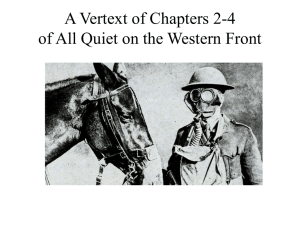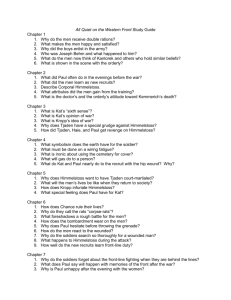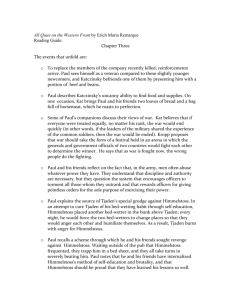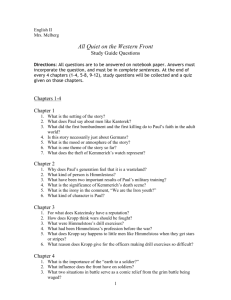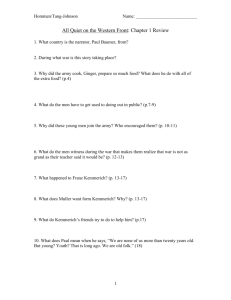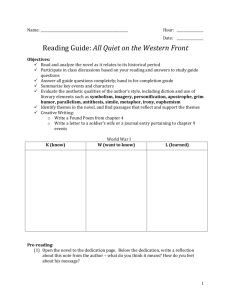12219,himmelstoss,10,12,"2000-02-12 00:00:00",170,http://www.123helpme.com/all-quiet-on-the-western-front-view.asp?id=168326,3.8,94300,"2016-02-26 09:16:22"
advertisement
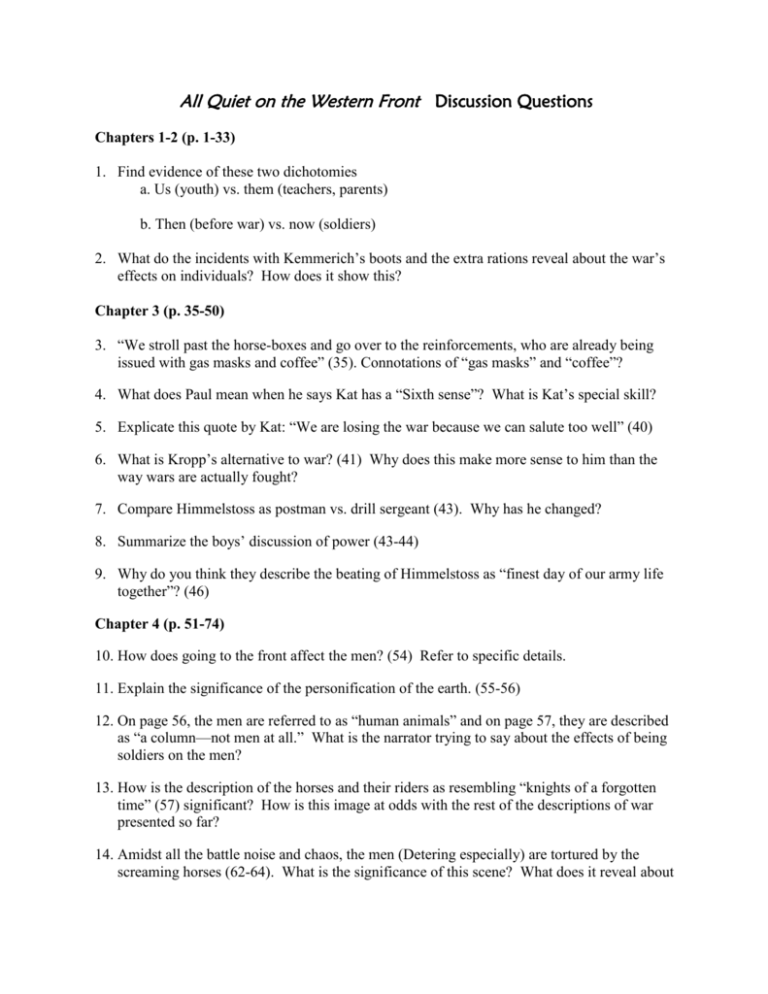
All Quiet on the Western Front Discussion Questions Chapters 1-2 (p. 1-33) 1. Find evidence of these two dichotomies a. Us (youth) vs. them (teachers, parents) b. Then (before war) vs. now (soldiers) 2. What do the incidents with Kemmerich’s boots and the extra rations reveal about the war’s effects on individuals? How does it show this? Chapter 3 (p. 35-50) 3. “We stroll past the horse-boxes and go over to the reinforcements, who are already being issued with gas masks and coffee” (35). Connotations of “gas masks” and “coffee”? 4. What does Paul mean when he says Kat has a “Sixth sense”? What is Kat’s special skill? 5. Explicate this quote by Kat: “We are losing the war because we can salute too well” (40) 6. What is Kropp’s alternative to war? (41) Why does this make more sense to him than the way wars are actually fought? 7. Compare Himmelstoss as postman vs. drill sergeant (43). Why has he changed? 8. Summarize the boys’ discussion of power (43-44) 9. Why do you think they describe the beating of Himmelstoss as “finest day of our army life together”? (46) Chapter 4 (p. 51-74) 10. How does going to the front affect the men? (54) Refer to specific details. 11. Explain the significance of the personification of the earth. (55-56) 12. On page 56, the men are referred to as “human animals” and on page 57, they are described as “a column—not men at all.” What is the narrator trying to say about the effects of being soldiers on the men? 13. How is the description of the horses and their riders as resembling “knights of a forgotten time” (57) significant? How is this image at odds with the rest of the descriptions of war presented so far? 14. Amidst all the battle noise and chaos, the men (Detering especially) are tortured by the screaming horses (62-64). What is the significance of this scene? What does it reveal about the men? Also, discuss Detering’s last quote at the bottom of page 64: “I tell you it is the vilest baseness to use horses in the war.” 15. Explicate this quote, “Then only again the rockets, the singing of the shells and the stars there—most strange” (64). Also consider the overall relationship of man and nature in this story. 16. What do you make of Kat and Paul’s desire to put the young recruit out of his misery? What does this reveal? (72-73). What is Kat and Paul’s relationship to the young recruit? (See also the incident with him on pages 61-62.) 17. What is the significance of the paragraph on page 74 from “Monotonously the lorries sway,” up to “...it falls in our hearts”. Consider also the use of word repetition and tone. Chapter 5 (p. 75-97) 18. What do we learn about the boys from their answer to Muller’s question about what they would do after the war? (76-80) 19. How do the boys feel about the two types of education they’ve received: their formal education and their military education? (84-85) 20. How are Kat, Haie and Detering different from the other boys? (86) 21. Closely analyze the discussion on page 87-88 top. How do they think the war will affect them when they go home? 22. What does this quote reveal: “That is our sole ambition: to knock the conceit out of a postman” (89). 23. One of the themes of this novel is the camaraderie that develops among the soldiers. How does the scene with Kat and Paul on page 94 demonstrate this? Chapter 6 (p. 99-136) 24. What is the purpose of having the narrator describe killing in such a nonchalant tone? (104) 25. How is the fighting described? Why do the men fight? (113-115) 26. How do the butterflies and larks contrast with the trench warfare? What statement do you think the author is making? (127-128). 27. What is revealed by Himmelstoss’s behavior during the fighting? (131-132) In your opinion, does this make him a more sympathetic character, or do you despise him more? Chapter 7 (p. 137-185) 28. How has Himmelstoss changed since he has been at the front? Why? How is his relationship with the boys different now? (137-138) 29. What change occurs in the boys when they have a break from the front? Why? What is their attitude towards life? (138-140). 30. What effect does the girl in the poster have on Kropp and Paul? What does Paul’s comment about her shoes reveal? (141-143) 31. Closely look at the boys encounter with the French girls. Find examples of imagery of (re)birth and childhood. What is the significance? (149-150) 32. Find several specific examples of how the author shows the contrast between the war Paul has come from and the civilian and domestic life he experiences while he is on leave. 33. Why doesn’t Paul like talking about the war? Explain a few of the reasons. (165-168) 34. How has Mittelstaedt become like Himmelstoss? (175-177). Consider also the earlier discussion of how power affects people (43-44). 35. Explain what is ironic about Paul’s mother’s warnings to “be on your guard against the women out in France. They are no good” and “Be very careful at the front” (183). 36. Overall, what effect does Paul’s leave have on him? 37. Compare Elisha from Dawn and Paul. Be sure to touch upon the fact that one of the things the French girls say “pauvres garcons” (148) means “poor boys.” Consider also the quote where Paul thinks “A few years ago we would have despised ourselves terribly” (138). Also, how is the “oppressed becoming like the oppressor” shown in this chapter? To what effect? Chapter 8 (p. 187-198) 38. Describe Paul’s relationship with nature (188-189). 39. Describe Paul’s relationship with the Russian POW’s (191-194). 40. Explicate this quote, “A word of command has made these silent figures our enemies; a word of command might transform them into our friends” (193-194). 41. While reading this chapter, consider the author’s purpose in writing this book. How does this chapter support Remarque’s purpose? 42. What is the situation with Paul’s family? (196-198) Chapter 9 (p. 216-229) 43. How do the men feel about the visit from the Kaiser? (202) 44. Using the following quotes, analyze the boys’ discussion of war: a. “We are here to protect our fatherland. And the French are over there to protect their fatherland. Now who’s in the right?” (203). b. “A country? I don’t follow. A mountain in Germany cannot offend a mountain in France. Or a river, or a wood, or a field of wheat” (204). c. “State and home-country, there’s a big difference” (205). 45. Who do the boys think benefits from war? (206) 46. Describe Paul’s experience in the shell-hole with Gerard Duval. How does this experience affect him? 47. “I thought of your hand-grenades, of your bayonet, of your rifle; now I see your wife and your face and our fellowship. Forgive me, comrade. We always see it too late. Why do they never tell us that you are poor devils like us….” (223). 48. What promises does Paul make to Gerard Duval? (224-226) Why does he make these promises? Do you think he will keep his promises? 49. How do Kat and Albert console Paul when he tells them the story of Gerard Duval? (228229) Chapter 10 (p. 231-269) 50. What do we learn in this chapter about how the war affects the villages and civilians? (up to 239) 51. What is similar about the first part of Ch. 10 (the feast) and the opening scene of the novel? (p. 1-7). 52. How do Albert Kropp and Paul react to their injuries? (240-242) 53. What difficulties do Albert and Paul encounter on the medical evacuation train? What does this reveal about them? (246-249) 54. How do the men respond the sisters’ prayers at the Catholic hospital? (251-252). Why do you think the soldiers have this attitude? Also discuss the general lack of religion in this war novel considering the commonly held belief that “there are no atheists in foxholes.” What inferences can you make? 55. Describe the conditions in the hospital. Also, what is the dying room? 56. According to Josef, why is the war a glorious time for all surgeons? (259) 57. Reread page 263 starting with “A man cannot realize…” and continuing until, “And what shall come out of us?” (264). Find examples of Paul’s disillusionment and emerging nihilism. (Nihilism is the delusion that things [or everything, including the self] do not exist; a sense that everything is unreal; complete denial of all established authority and institutions.) 58. Explicate this quote, “The devil take all conventions, they were made for other times” (266). Although this specifically refers to Lewandowski and his wife, find other examples from the novel of when the conventions of “normal” life are cast aside. Are the conventions people follow absolute or the product of a specific environment? Elaborate. 59. How does Kropp’s amputation affect him mentally? (262, 268) 60. Why do you think the author skips over Paul’s second visit home and return to the front? (269) Chapter 11 (p. 271-291) 61. “War is the cause of death like cancer and tuberculosis, like influenza and dysentery. The deaths are merely more frequent, more varied and terrible” (271). What are some other crucial differences between death caused by disease vs. death caused by war? 62. What is so painful and frustrating to the soldiers during the summer of 1918? (284-285). 63. What evidence is there that Germany is not faring well in the war? (280-282, 286) *On your character chart, be sure to fill in what happens to Detering (275-277), Bertinck (283284), Leer (284), and Kat (287-291). Chapter 12 (p. 293-296) 64. Reread the prophetic paragraph on page 294 that starts with, “And men will not understand us—“ How does the fact that Remarque wrote this novel 10 years after the way affect your understanding of the paragraph? 65. Why do you think the author chose to make Paul’s death so vague? 66. What is ironic about Paul’s death? (296) 67. Analyze the last line, focusing on the underlined parts: “Turning him over one saw that he could not have suffered long; his face had an expression of calm, as though almost glad the end had come” (296). Overall Questions 68. What was the author’s purpose in writing this novel? Was his method effective? 69. How does Remarque’s writing this book relate to the promise Paul made to Gerard Duval? 70. What affect did reading this book have on you?
